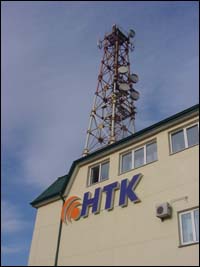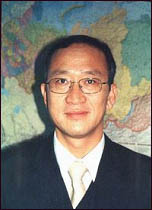 TELECOMMUNICATIONS TELECOMMUNICATIONS |
Russia's telecom market has grown 60 percent faster
than the country's economy over the last few years,
and Primorsky Krai is certainly a current growth
area. The three main players in the region are Primtelephone,
which recently expanded to Sakhalin, Akos, the first
mobile operator in the region, and is currently
developing GSM standards and New
Telecom Company (HTK), a venture of Korea Telecom.
The rapidly growing HTK
is an example of successful foreign investment in
the region's infrastructure, overcoming the challenges
of low population density and large geographic distances.

Korea Telecom bought HTK
in 1998, and over the next two years invested over
$13 million in the company, also gaining a $12 million
loan from the European Bank of Reconstruction and
Development. "Korea Telecom is seeking the
ways and means to expand its business abroad because
it understands that the market in Korea is saturated,"
says former general
director Yun Hae Jong.
HTK has installed cable
phone lines in Vladivostok, where there are huge
waiting lists for telephone installations from Vladivostok
City Telephone Network, and has offered a GSM 900
network for mobile users since 1997, covering Vladivostok,
Nakhodka and Ussurisk, with around 60,000 subscribers,
while competitors have around 50,000 subscribers.
"We have seen strong growth rates, especially
from the year 2000 up until now. I also believe
that for the next 2 or 3 years the growth rate will
continue to be very high," says Yun
Hae Jong, stating that the company expects 2002
to show a profit of over $3 million.
|

Primorye's hilly landscape and scattered centres
of population with few modern roads makes installing
telecommunications a challenge, admits the director.
"This region has quite tough terrain, so it
is not easy to put a cable just anywhere as it is
very costly," says Yun
Hae Jong. "As a mobile operator we face
numerous infrastructure problems and we cannot install
all the links. As a consequence, in some regions
we cannot provide adequate coverage due to the fact
that no transmission links exist."
However, the former general director anticipates
that HTK
could cover over 90% of mobile operations throughout
the region by the end of 2003. The company also
hopes to expand to cover the whole Far Eastern region
and Siberia, believing that investments will be
forthcoming once it has received the licences and
frequencies. "We are thinking about different
ways to expand our business to other Russian regions.
We want to make our company a model business for
foreign investors," says Yun
Hae Jong.
The company has been successful in building relationships
with local operators and the regional administration,
believes Yun Hae Jong,
saying that, "It's all about trust."
However, the Korean company admits that the comparatively
smooth path may be thanks to the company's major
investors, while smaller businesses may have more
difficulties. "Small businessmen or other business
centres face problems with local people or other
competitors, but fortunately we do not have any
serious problems regarding this factor." Says
Mr Yun.
|

